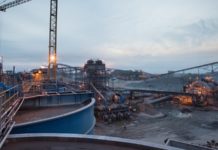
[miningmx.com] – PRESIDENT Jacob Zuma’s vow to keep the South
African mining industry competitive in his State of the Nation address on Thursday
could be a reference to the now-abandoned mines nationalisation “discussion’. Yet
his comments might serve better as a forward-looking declaration that the disparate,
sprawling, almost random recommendations contained in the State Intervention in
the Minerals Sector (SIMS) report won’t be applied, or would only be applied after
some profound revision.
The main, over-arching problem with SIMS is that it pretends the mining charter and
the Minerals and Petroleum Resources Development Act wasn’t written 10 years ago.
It also seems to think the much-fought-over Royalty Act is dispensable; a mere sally
on the road to a grander vision of which SIMS is the articulation.
Certainly that’s the view of a prominent individual in the mines ministry itself. For
him, SIMS is dominated by the ideology of one of its authors, the former Mintek CEO
and ANC politician, Paul Jordaan. It is subsequently thin on practicalities.
Said a ministry source: “The practicalities of the licence application process has
sobered us up. The document is ideological.
“In the sense that it moves us away from nationalisation, it is useful. But as a future
document, it leaves much to be desired.’
Only a third of mining and prospecting licence applications meet the Department of
Mineral Resource’s own deadlines. Quite how it, or the mega-ministry Jordaan
envisages, would cope with a broader administration remit is anyone’s guess.
Still, all is not lost.
One suggestion flowing from SIMS is that it will trigger a parallel process, under the
aegis of MIGDETT, between Government, organised labour and the mining industry
(whereas SIMS is an ANC affair), the mining industry’s Codesa 2.
In this parallel process some of the SIMS ideas will be discussed, but the desired
outcome from a Government point of view is that stakeholders take cognisance of
the 10 years that have passed between promulgation of the MPRDA and now, and
recommit themselves to the labour and social plans, training and beneficiation plans
they drew up.
The mines ministry is not seeking more participation per se in the mining industry if a
way can be found to better divide up the wealth that mining generates.
So instead of worrying about the back-and-forth linkages that a mega-ministry would
create (didn’t Government split energy from mining for a reason?), better to improve
the effectiveness of the municipalities, since it is through local government the social
plans of mining companies are implemented. That’s just one example of how SIMS
can be an enabling tool rather than a source of renewed investor uncertainty.
“We don’t need to rewrite the laws,’ says the ministry source. “We need better
strategies and a commitment on the part of the stakeholders to share the minerals.’










